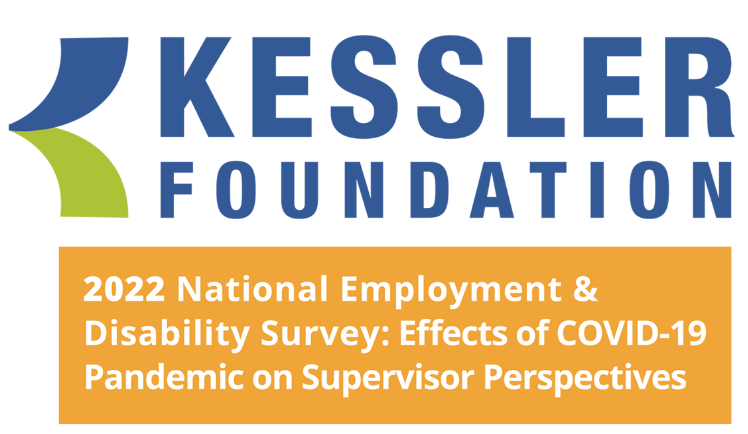 Survey compares the workplaces of 2017 and 2022 from the perspectives of supervisors, revealing gains in recruiting, hiring, accommodating, and retaining employees with disabilities
Survey compares the workplaces of 2017 and 2022 from the perspectives of supervisors, revealing gains in recruiting, hiring, accommodating, and retaining employees with disabilities
EAST HANOVER, NJ – October 21, 2022 – Kessler Foundation released thought-provoking findings from a new national survey that details the impact of the COVID-19 pandemic on the workplace experiences of people with disabilities. The 2022 Kessler Foundation National Employment and Disability Survey: Effects of COVID-19 Pandemic on Supervisor Perspectives compares the employment practices of today with those elicited by a similar Kessler Foundation Survey conducted in 2017. Both surveys were conducted in partnership with the University of New Hampshire Institute on Disability.
The five-year gap between the surveys spans a critical timeline comprising pre-pandemic, pandemic lockdown, and pandemic recovery, enabling researchers to capture changes in the processes and practices employers use to recruit, hire, train, accommodate, and retain people with disabilities, as well as differences in the attitudes and commitment of supervisors and upper management.
“The impact of the pandemic on our economy was profound, prompting sudden large-scale shifts in the economy,” said Elaine E. Katz, MS, CCC-SLP , senior vice president of grants and communications at Kessler Foundation. “This new survey provides a unique look at the ways employers and supervisors adapted to these changes, and how some of those changes have significantly affected the workplace experiences of people with disabilities.”
The new survey builds upon the 2017 National Employment & Disability Survey: Supervisor Perspectives , which used an innovative design to identify effective practices. Both surveys asked supervisors whether their organization used a particular employment practice, and if so, whether it was effective. When a practice applied to both people with and without disabilities, both surveys asked whether the practice was as effective for people with disabilities. Respondents also answered questions about their own commitment and their perceived commitment of upper management to specific processes and practices that support the success of their employees.
“According to our findings, the COVID-19 pandemic positively impacted the use of disability-related employment practices by focusing greater attention on accommodation processes and increasing the use of remote work, flexible work schedules, and job sharing,” said survey co-author Andrew Houtenville, PhD , professor economics and research director at the University of New Hampshire Institute on Disability. “While all workers benefited from the expansion of flexible work arrangements,” he emphasized, “many of these changes have been as effective, and in some instances, even more effective, for employees with disabilities.”
The use of flexible work arrangements more than doubled from 2017, with the majority of supervisors predicting that work-from-home options would continue post-pandemic. And today, twice as many supervisors work for organizations with a central accommodation fund, which supervisors view as important to the success of people with disabilities in the workplace.
Hiring and recruiting people with disabilities was more important to both supervisors and upper management in 2022, and more organizations had established hiring goals than in 2017. “Today, more companies are partnering with disability organizations in their recruitment efforts,” said John O’Neill, PhD , director of the Center for Employment and Disability Research at Kessler Foundation, and a survey co-author, “and more are using outside assistance for onboarding workers with disabilities. We also see more employers adopting training on disability issues and cultural competence in 2022 and reaching out to government and local resources regarding the provision of accommodations.”
“More changes lie ahead, as the workplace continues to adapt to the evolving economy and labor market challenges,” concluded Katz. “With the information this survey yields, we are better equipped to find ways to help people with disabilities maintain the gains they have achieved by striving to work.”
Interested in more details? Read the 2022 Survey Executive Summary .
Learn more about this topic by following National Trends in Disability Employment (nTIDE), the semi-monthly report co-authored by Drs. Houtenville and O’Neill. Register for the November 4, 2022, nTIDE webinar at: nTIDE Lunch & Learn Webinar Series | Center for Research on Disability
About the Institute on Disability at the University of New Hampshire
The Institute on Disability at the University of New Hampshire (UNH) was established in 1987 to provide a university-based focus for the improvement of knowledge, policies, and practices related to the lives of persons with disabilities and their families. For information on the NIDILRR-funded Research and Training Center on Disability Statistics, visit ResearchOnDisability.org .
About Kessler Foundation
Kessler Foundation, a major nonprofit organization in the field of disability, is a global leader in rehabilitation research that seeks to improve cognition, mobility, and long-term outcomes – including employment – for people with neurological disabilities caused by diseases and injuries of the brain and spinal cord. Kessler Foundation leads the nation in funding innovative programs that expand opportunities for employment for people with disabilities.